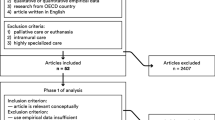Abstract
In this chapter, the author explores the concept ‘dignity’ by connecting it to social justice and vulnerability. Vulnerability because care and social work users are generally spoken perceived as vulnerable people. Social justice because it is the brother or sister of dignity; They belong together. The lecture is constructed along four concepts: Dignity, vulnerability, moral vulnerability, social justice, and a final section on tensions and essentials.
Access this chapter
Tax calculation will be finalised at checkout
Purchases are for personal use only
Similar content being viewed by others
References
Arendt, H. (1958). The human condition. Chicago: University of Chicago Press.
Arendt, H. (1979). The origins of totalitarianism. London: Harcourt, Brace & World (orig. 1951).
Arendt, H. (1981). The life of the mind. One Volume Edition (M. McCarthy, Ed.). San Diego, New York, London: Harcourt (orig. 1978).
Bandura, A. (1982). Self-efficacy mechanism in human agency. American Psychologist, 37(2), 122–147.
Bandura, A. (Ed.). (1995). Self-efficacy in changing societies. Cambridge, UK: Cambridge University Press.
Bandura, A. (1997). Self-efficacy: The exercise of control. New-York: W. H. Freeman.
Beresford, P., Adshead, L., & Croft, S. (2007). Positive care, social work and service users: Making life possible. London, UK: Jessica Kingsley.
Billig, M. (1991). Arguing and thinking: A rhetorical approach to social psychology. Cambridge, UK: Cambridge University Press (orig. 1987).
Bourdieu, P. (1984). Distinction, a social critique of the judgement of taste. Cambridge, MA: Harvard University Press.
Damásio, A. (2010). Self comes to mind—Constructing the conscious brain: The evolution of consciousness. Porthmouth, HN: Heinemann.
de Waal, F. (2009). The age of empathy: Nature’s lessons for a kinder society. New York, NY: Harmony Books.
Donner, P. H. (2016). Laat je niet gek maken. https://www.raadvanstate.nl/publicaties/toespraken/tekst-toespraak.html?id=961&summary_only=&category_id=13. Accessed April 20, 2018.
Frost, R. (2011). The right to justification: Elements of a constructivist theory of justice. Columbia, NY: Columbia University Press.
IFSW. (2018). Definition of social work. http://ifsw.org/policies/definition-of-social-work/. Accessed April 20, 2018.
Kunneman, H. (2009). Voorbij het dikke-ik. Bouwstenen voor een kritisch humanisme. Deel 1. Amsterdam, The Netherlands: SWP.
Kunneman, H. (2017). Amor complexitatis. Bouwstenen voor een kritisch humanisme. Deel 2. Amsterdam, The Netherlands: SWP.
Leget, C. (2011). Menselijke waardigheid en humanisering van de zorg. Tijdschrift Geestelijke Verzorging, 14(62), 8–17.
Morin, E. (2008). On complexity. Cresskill, NJ: Hampton Press.
Noordegraaf, M. (2009). Managing by measuring? Professional organizing in and around public service delivery. In H. U. Otto, A. Polutta, & H. Ziegler (Eds.), Evidence-based practice—Modernizing the knowledge base of social work? (pp. 185–209). Leverkusen, Germany: Barbara Budrich.
Nussbaum, M. C. (2011). Creating capabilities: The human development approach. Cambridge, MA: Harvard University Press.
Polanyi, M. (1969). Knowing and being. Chicago, IL: University of Chicago Press.
Polanyi, M. (2009). The tacit dimension. Chicago, IL: University of Chicago Press.
Price, V., & Simpson, G. (2007). Transforming society? Social work and sociology. Bristol, UK: The Policy Press.
Rawls, J. B. (1999). A theory of justice. Cambridge, MA: Belknap Press of Harvard University Press, 1971 (1999, revised version).
Ricoeur, P. (1994). Oneself as another. Chicago: University of Chicago Press.
Sen, A. (2010). The idea of justice. London, UK: Penguin Books.
Taylor, C. (1989). Sources of the self: The making of the modern identity. Cambridge, MA: Harvard University Press.
UN, The International Forum for Social Development. (2006). Social justice in an open world: The role of the United Nations. New York : United Nations.
Van Ewijk, H. (2010). Maatschappelijk werk in een sociaal gevoelige tijd. Amsterdam: SWP/Humanistics University Press.
Van Ewijk, H. (2018). Complexity and social work. Abingdon: Routledge.
Van Ewijk, H., & Kunneman, H. (Eds.). (2013). Praktijken van normatieve professionalisering. Amsterdam, The Netherlands: SWP.
Van Heijst, A. (2006). Dignity as a relational concept: Arguments pro and contra from the ethics of care. In H. Goris (red.), Bodiliness and human dignity (pp. 89–97). Tilburg: Theological Studies 2.
Witchen, H. U, Jacobi, F., Rehm, J., Gustavsson, A., Svensson, M., Jönsson, B., & Olesen, J. (2011). The size and burden of mental disorders and other disorders of the brain in Europe 2010. European Neuropsychopharmacology, 21, 655–679.
Author information
Authors and Affiliations
Editor information
Editors and Affiliations
Rights and permissions
Copyright information
© 2020 The Author(s)
About this chapter
Cite this chapter
van Ewijk, H. (2020). Dignity and Social Justice. In: S.M., S., Baikady, R., Sheng-Li, C., Sakaguchi, H. (eds) The Palgrave Handbook of Global Social Work Education. Palgrave Macmillan, Cham. https://doi.org/10.1007/978-3-030-39966-5_44
Download citation
DOI: https://doi.org/10.1007/978-3-030-39966-5_44
Published:
Publisher Name: Palgrave Macmillan, Cham
Print ISBN: 978-3-030-39965-8
Online ISBN: 978-3-030-39966-5
eBook Packages: EducationEducation (R0)




